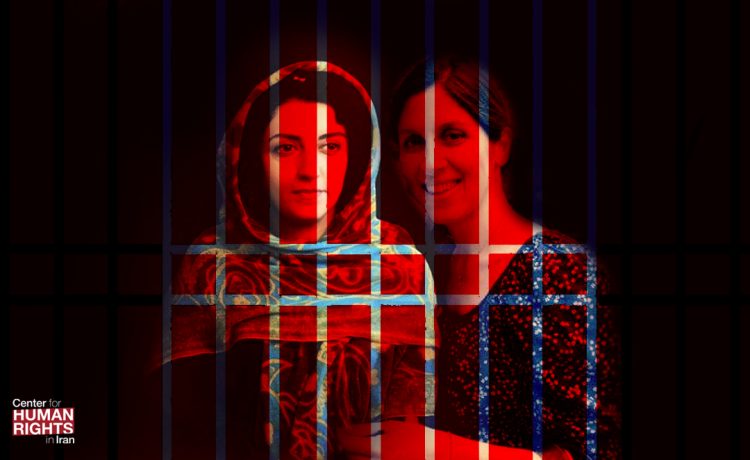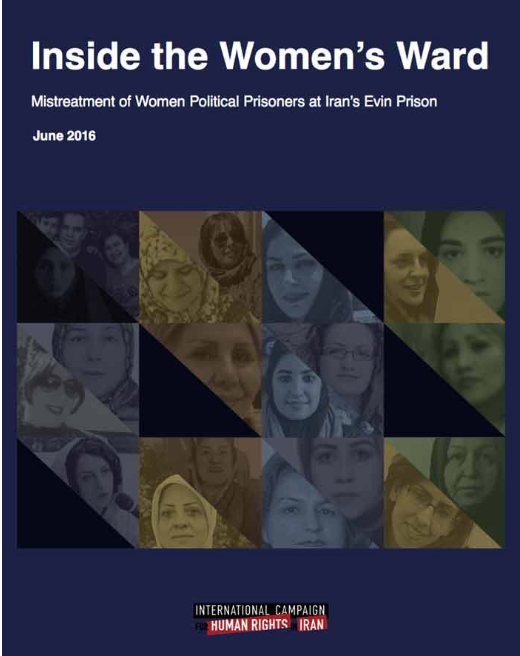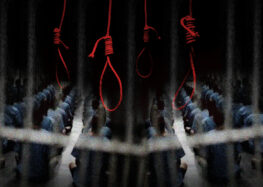Open Letter: Mohammadi and Zaghari-Ratcliffe to Hunger Strike for Access to Medical Treatment
 Will Take “Other Steps” if Authorities Continue to “Endanger” Their Health
Will Take “Other Steps” if Authorities Continue to “Endanger” Their Health
Political prisoners Narges Mohammadi and Nazanin Zaghari-Ratcliffe have written an open letter warning that they will go on hunger strike if the authorities continue to deny their requests for medical treatment.
The letter, dated December 30, 2018, was published in Farsi by the Iranian Defenders of Human Rights Center on January 2, 2019.
“We will go on a hunger strike for three days from January 14 until the end of January 16… to protest against [the judiciary’s] unlawful, inhuman and un-Islamic actions and demand immediate attention,” said the letter according to a translation by the Center for Human Rights in Iran (CHRI).
“We declare that we shall take other steps in protest if the authorities of the Islamic Republic of Iran fail to act and further endanger our health for which they will be responsible for any consequences,” wrote the prisoners.
Mohammadi and Zaghari-Ratcliffe added:
“Access to physicians and medication is a right clearly enshrined in Iran’s domestic regulations concerning prisons as well as international laws and yet unfortunately we have been denied it for a long time despite many requests made to the authorities.”
“Only a few months ago, we went to the Evin Prison clinic and got checked by a specialist doctor trusted by the State Prisons Organization, who issued a written order to transfer us to an emergency medical center. But for unknown reasons the authorities prevented it.”
The political prisoners also stressed that the authorities are putting their health in danger by denying treatment: “There is a case to present this serious question: Are our health and very survival not in real danger when we are denied visits to physicians to re-issue our depleted prescription medication? Is this behavior in compliance with the law and humanitarian principles?”
CHRI revealed in 2016 that political prisoners held in the Women’s Ward of Evin Prison endure inhumane conditions, including the denial of proper medical care in a prison infirmary that is dirty and lacking in supplies and medical specialists, denied or delayed transfer to hospital and specialists for treatment of serious illnesses, inadequate nutrition, and intermittent lack of heat.

Report: Inside the Women’s Ward: Mistreatment of Women Political Prisoners at Iran’s Evin Prison
Mohammadi and Ratcliffe, both held in the Women’s Ward, have long complained of illnesses for which they have been denied medical care.
In a November 2018 open letter, Mohammadi said she had not been allowed to see a doctor outside the prison for more than a year despite suffering from life-threatening ailments including seizures and blood clots.
“I will not go into the unfair sentences against me,” she wrote, “but I am asking Your Excellency to at least take steps to allow me to have access to medical treatment and specialist physicians who have been taking care of me for years, as well as access to medications.”
Since 2015, Mohammadi has been serving a 16-year prison sentence for the charges of, “membership in the [now banned] Defenders of Human Rights Center,” “assembly and collusion against national security,” and one year for “propaganda against the state.” She will be eligible for release after serving 10 years.
Iranian British dual citizen Zaghari-Ratcliffe has suffered multiple ailments since being arrested in April 2016 by the Islamic Revolutionary Guard Corps’ Intelligence Organization in Tehran on her way home to London.
A former staff member of the Thomson Reuters Foundation, Zaghari-Ratcliffe was accused of committing espionage and sentenced to five years in prison in September 2016 (upheld by an Appeals Court in January 2017).
In July 2018, a judge told Zaghari-Ratcliffe that she was being held as a bargaining chip by the Iranian government to use in its dealings with the UK.
In September 2018, her husband, Richard Ratcliffe, told CHRI that his wife’ health had severely declined since she was forcibly returned to Evin Prison after a three-day furlough, the first she had been granted since her imprisonment.
“Her psychiatrist said that her condition had gotten worse because it had not been treated and because she had been subjected to extreme stress,” Ratcliffe said.
Ratcliffe noted that instead of receiving medical furlough or treatment for her condition, Zaghari-Ratcliffe was threatened with being denied medical treatment.
“The prison clinic has instead said, ‘We have decided you are not taking your pills because you do not take them in front of us,” he added. “So, we are considering stopping you from seeing the psychiatrist.’”
Political prisoners in Iran, including elderly inmates, are singled out for harsh treatment, which often includes denial of medical care. The threat of withheld medical care has also been used as an intimidation tool against prisoners who have challenged the authorities or filed complaints.
According to Article 520 of Iran’s Code of Criminal Procedures: “…In cases of serious illness or the death of close relatives or a child’s wedding, prisoners can be granted furlough for five days with the prosecutor’s approval.”
Article 522 states: “If a convicted person requires treatment outside the prison, the presiding judge can set a period necessary for treatment based on the Medical Examiner’s opinion and payment of a security deposit, while delaying the implementation of the sentence. If the convicted person does not provide a security deposit, hospital treatment will take place under guard and the period of treatment will be considered part of the prison term.”
But furlough, temporary leave typically granted to prisoners in Iran for a variety of familial, holiday, and medical reasons, is routinely denied to political prisoners as a form of additional punishment.
The death of Vahid Sayyadi-Nasiri in December 2018 after he was transferred from Langroud Prison in Qom where he was being held to Shahid Beheshti Hospital where he died following a prolonged hunger strike has put the spotlight on the importance of Iran’s State Prisons Organization (which is responsible for prisoners) and the judiciary to which it reports immediately addressing the needs of political prisoners in Iran in accordance with Iran’s domestic and international legal obligations.
In addition to political prisoners dying following hunger strikes, some prisoners have reported suffering irreparable harm due to the denial o medical treatment while in state custody.
In August 2017, former political prisoner Alireza Rajaee lost part of his face due to an operation for sinus cancer that was left untreated in Evin Prison.
Three months later, in October 2017, labor activist Mohammad Jarrahi died from thyroid cancer that was left untreated while he was held as a political prisoner in Tabriz Prison. Fellow labor activist Shahrokh Zamani had also died of a heart attack in September 2015 after being denied medical care in Rajaee Shahr Prison.
Political prisoner Omid Kokabee was diagnosed with advanced kidney cancer in 2016 after years of repeatedly being denied treatment for his symptoms in Evin Prison.
Multiple prisoners held on politically motivated charges reported denial of medial treatment in 2018, including Atena Daemi, Golrokh Iraee Ebrahimi, and Arash Sadeghi, Saeed Shirzad, Nizar Zakka, Ahmadreza Djalali and Kamran Ghaderi.






